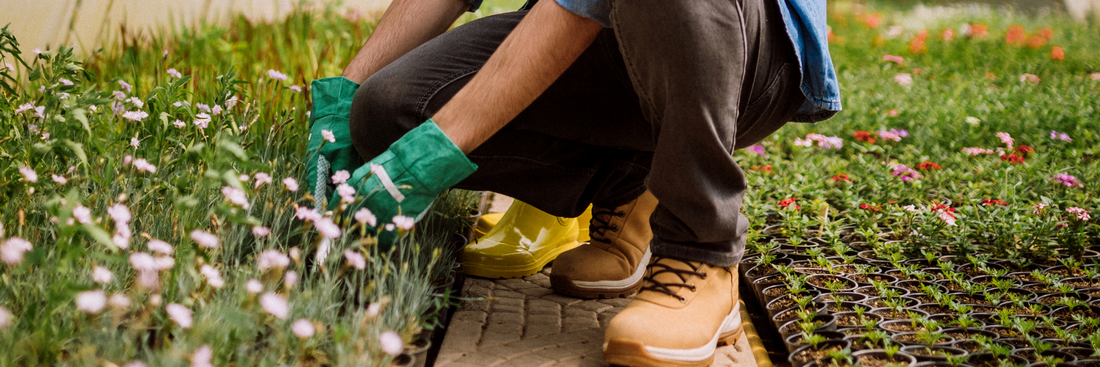The global cut flower market is currently estimated to be worth $36.4 billion USD (over $54 billion AUD) and is expect to rise to $45.5 billion USD (over $67 billion AUD) by 2027. And in Australia more than 50% of all flowers sold are imported. While we’re wholly supportive of a growing cut flower industry, the reliance on imported flowers means that we’re facing serious environmental and social impacts – the ‘real costs’ of imported flowers.
Since the first seed was planted in the first field here at the Flower Farm, we’ve always embraced the ethos of local, sustainable and eco-friendly. The catchy and memorable, ‘Grown Not Flown’ movement captures that ethos for us as well. More importantly, the Grown Not Flown movement helps us to offset the real costs of buying imported flowers.
Grown Not Flown Flowers: Understanding the Real Costs of Imported Flowers

Hugely increased carbon footprint of long-distance shipping
The idea of a carbon footprint has been around for quite some time. Here in Australia we’ve learned to look at our own carbon footprint at home. But we haven’t always considered the carbon costs of imported flowers.
In Australia, for example, we have fantastic growing conditions for many flowers, but not all. Certain types of highly prized roses require conditions found at high altitude near the equator. These blooms need to come from Ecuador and other equatorial countries. Some orchids, such as Dendrobium and Phalaenopsis, required a combination of seasons not available in Australia. Because of this Australia imports these varieties from Thailand, Singapore and Taiwan.
When these flowers are transported into Australia they come with high CO2 emissions from the flights. They often require refrigerated shipping as well to ensure freshness (another factor that leads us to prefer local flowers!), and using this refrigeration vastly increases the carbon footprint.
Expanded biosecurity concerns

Many biosecurity concerns have been raised about importing flowers from overseas. In fact, growers have been importing flowers for more than 50 years here in Australia, but the increasing demand leads to increasing imports which leads to increasing risks.
If a biohazard such as a pest or disease is brought into our country, this could significantly damage the floral industry – or even our other produce generally – and impact our beautiful native environment.
More chemical concerns

Source: www.agriculture.gov.au
Imported flowers will almost always arrive in Australian retailers with more chemicals. This is partly because of the excessive use of pesticides in most commercial farming ventures. But it’s also due to Australian biosecurity laws which require that imported flowers comply with environmental safeguards.
In order to meet Australian biosecurity safeguards, all imported flowers are inspected before shipment and again upon arrival. If any live insects or any other biosecurity risks are found, importers must fumigate their flowers before shipping them to Australial, here in Australia once they've arrived or even both.
This is in addition to any pesticides or other chemicals that are used in the growing of the flowers themselves, which can vary from country to country and is not always transparent to the end consumer (that’s you and me!).
What that means is that almost all imported flowers will come to you with at least one round of chemicals applied (if not many more!).
Increased water usage

The cultivation of all cut flowers can be a water-intensive process. However, this water usage can have a disproportionately negative impact on poor and water-poor countries.
For example, floriculture accounts for 45 % of ‘virtual’ water exports from Kenya (virtual water is the amount of water required to produce a product). These kinds of export numbers can put strain on countries and unequal pressure on water-poor countries impacting on their other vital productions.
The Benefits of Grown Not Flown Flowers

There’s a simple solution to offset the real costs of imported flowers. It’s simply to embrace grown not flown flowers which delivers reduced carbon emissions, sustainable water use (in most cases), less pesticide and chemical risk and no biosecurity concerns.
Freshness and reduced carbon emissions
Local flowers significantly reduce carbon emissions and support a healthier planet (particularly when you buy from an eco-conscious flower farm like us!). Even better, local flowers aren’t sitting in refrigerated transport for up to a week at time. So you’ll be sure to get unparalleled freshness.
No biosecurity concerns
When you buy local flowers you’ll never have to worry that you’re contributing to biosecurity concerns. It’s simply not an issue!
Less chemicals and pesticides
When you concentrate on grown not flown flowers you know that you’re already knocking off any import related fumigation. You’re also far more likely to be able to tailor your purchases to growers who focus on eco-friendly practices that are low-chemical or even chemical free!
Sustainable water use
When you choose a local grower, you’ll want to ensure they’re embracing sustainable practices like we do at The Flower Farm. This includes practicing water conservation aligned with the grown not flow ethos. This is better for the environment and the flowers!
Making the Sustainable Switch to Grown Not Flown Flowers
Sourcing local 'grown not flown flowers' is a powerful step towards a more sustainable and ethical flower industry. And when you make this choice you’ll not only benefit the environment but also bolster community ties and support your local economy.
At The Flower Farm, we’re proud to be a sustainable, local flower farm and champions of the Grown Not Flown movement. Our team would love to help you choose blooms that are not only beautiful but beneficial to our environment and economy! Get in touch!
For more information on the benefits of locally grown flowers, check out:


